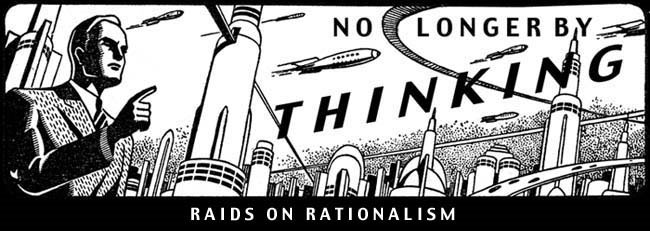Happy atheists.

Besides what they’re for, look at what they’re against: waxwork TV evangelists, public stoning of fornicators, self-flagellation, and so much more.
The big problem with atheism is its too-frequent religiosity. For the last few years, the U.S. media have been all a-titter about the prominent intolerance of atheists like Richard Dawkins (“faith is one of the world’s great evils, comparable to the smallpox virus but harder to eradicate”) [1] and Christopher Hitchens (“religion poisons everything”) [2]. This kind of atheism is nothing new, but it is tragic in the same way that bad religion is tragic: as the betrayal of a good thing.
Consider David Lazare’s May 10 review of Dawkins’s and Hitchens’s latest books in The Nation [3]. Lazare, referring to the 2006 Templeton Foundation prayer study which found that systematically prayed-for surgery patients fared no better than controls [4], chortles that the study shows "praying for a quick recovery is on a par with crossing one's fingers and wishing for a Mercedes." Christian disavowals of the study itself are in bad faith: "People like" British theologian Richard Swinburne, who criticized the study—you know, those people—would surely have trumpeted positive results as proof of God's existence.
And so, self-appointed Lancelot of rigor and reason Lazare rides his self-righteousness at full gallop into an intellectual wall. The fact is that well-known Christian writers have denigrated the possibility of such prayer experiments for a long time. George MacDonald wrote in 1885,
As to the so-called scientific challenge to prove the efficacy of prayer by the result of simultaneous petition, I am almost ashamed to allude to it. . . . That God should hang in the thought-atmosphere like a windmill, waiting till men enough should combine and send out prayer in sufficient force to turn his outspread arms, is an idea too absurd. . . . A man capable of proposing such a test, could have in his mind no worthy representative idea of a God, and might well disbelieve in any: it is better to disbelieve than believe in a God unworthy. [5]
George MacDonald, 1824–1905

Nor am I quoting some long-forgotten nobody; the book is still in print. More recently, C.S. Lewis wrote that such a test would be impious and, even if apparently successful, would not “prove the Christian doctrine at all.” [6] He was right. Real science, as exasperated scientists have been trying to explain for years to proponents of Intelligent Design, doesn't do the supernatural.
The sweeping, jocular ignorance with which Lazare, Hitchens, and Dawkins handle theology closely resembles the stock Creationist style of dissing evolution. Intellectual bigotry always flatters itself as common sense.
It’s too bad; atheism deserves better.
-------------------------------------------------------------------------
[1] www.thehumanist.org/humanist/articles/dawkins.html (accessed May 28, 2007)
[2] Subtitle of Hitchens’s book God is Not Great, 2007.
[3] http://www.thenation.com/doc/20070528/lazare/3 (accessed May 28, 2007).
[4] “Long-Awaited Study Questions the Power of Prayer,” Benedict Carey, New York Times, March 31, 2006: http://www.nytimes.com/2006/03/31/health/31pray.html?ex=1301461200&en=4acf338be4900000&ei=5088
[5] In fact, it can be downloaded for free as an e-text. Unspoken Sermons, Second Series, by George MacDonald, available from Johannesen Publishing: http://www.johannesen.com/index.html
[6] In the essay “The Efficacy of Prayer,” which first appeared in The Atlantic Monthly, Jan. 1959.





